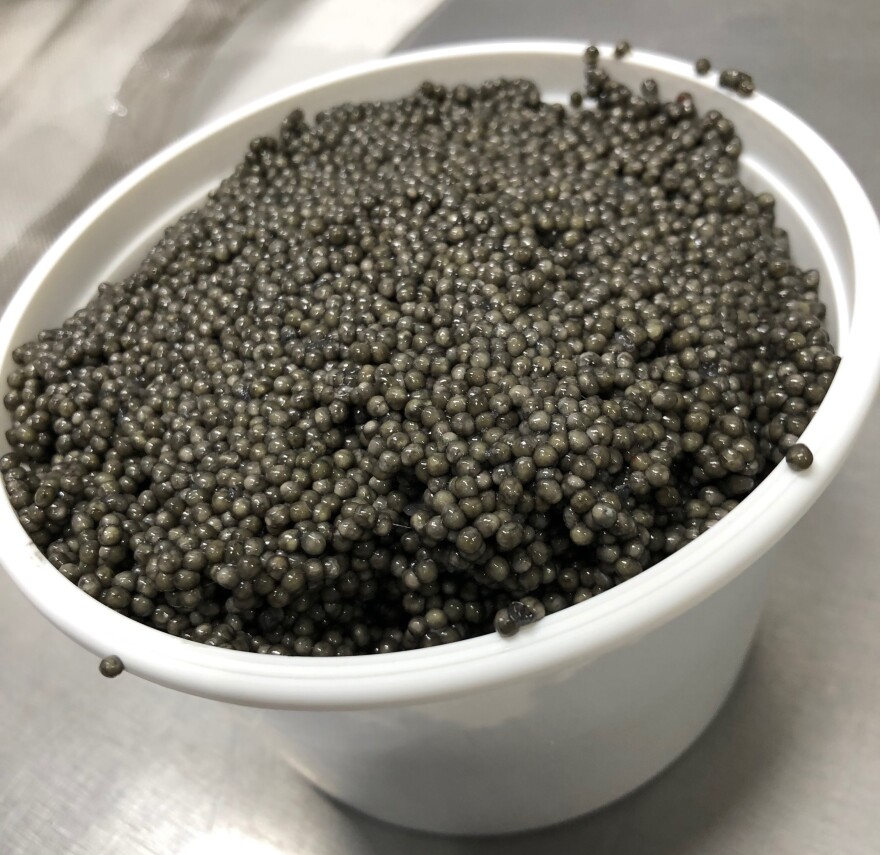Lake City Fish Market is somewhat nondescript -- a metal-sided warehouse makes up the entire business, situated a few miles from Kentucky Dam.
Inside, sun-wrinkled fishermen come and go, hauling mostly catfish -- "kitty cats", as one fisherman affectionately calls them -- into the pools of water throughout the warehouse.
Fish Market Owner David Fields says processing catfish makes up about 80% of his business, but it's the other part of his workday that usually surprises people.
"I can tell you 95% of the time, whenever I've told someone I do caviar the first thing they say is -- 'fish eggs?'" said Fields. "Man, nobody really knows about it. I lived on a lake, and I didn’t know about it."
Fields bought the market on a hunch in 2012, having only been a sports fisherman before that point. Since then, west Kentucky fishermen bring paddlefish and sturgeon full of these fish eggs from local rivers to his place.

Each fish can hold several pounds of eggs, totaling thousands of dollars when sold to wholesalers and restaurants.
"I've seen three different colors so far [of caviar]. I’ve seen a gray color, I’ve seen a lighter, green-type color and I've seen a black one," Employee Jesse Speed said. "Since we went worldwide with it, I'll get calls and texts. Family members ask me what it tastes like and how cool it is to do all of it."
Speed is one of the few people Fields has trained to make the caviar, a process that can look simple -- but requires a delicate touch. A four-foot-long paddlefish is brought into the market that morning, and Speed gets to work.
He starts by cutting open the paddlefish to take out the heavy, shiny grey egg sac.

The egg sac is then rubbed into a metal screen to separate each individual egg. They're washed and rinsed in a large bowl, removing the bits of fish fat and "bad eggs" from the caviar.
"Like bad apples, a lot of your bad eggs will float to the top [of the bowl]," Speed said. "For instance, with like fruit and stuff, if you put bad fruit with good fruit, it'll turn everything else bad."
It's salted with a secret ingredient -- "I'm not allowed to tell", Jesse says -- and finally dried.

After being put in a freezer or cooler to store, the caviar is finally shipped to places far and wide. The result?
"You know it's kind of got a buttery flavor," Fields said. "The sturgeon is more like if you took a half of a cashew and put just a drop of butter on it. The flavor profile in your mouth is kinda what caviar tastes like."
Fields said that flavor has gotten acclaim and customers from cities including Louisville, New York, Seattle, Los Angeles and even Moscow. He says it's "America's Best Caviar", and he brands it as such.
And he said a big part of the flavor is because the fish eggs are wild caught in Kentucky, by people like 70-year-old Tom Davis, a large fisherman with rosy cheeks and a white beard, who's been on the water for decades.

"They've lived here for 40, 50 years like me, and they’ve never seen this fish or known the caviar was worth any money," Davis said. "There's always been a market for them. It's just been more notable now than in the last 30, 35 years."
But the money he makes from caviar doesn’t mean he likes caviar himself.
"I'm glad other people are, because it keeps me in business," Davis said. "I don't want to acquire a taste for something that that's expensive. I’m a peanut butter eater," Davis said.
Fields didn't always have this success, though. He took a risk in 2012 when he quit his stable job as a assistant principal at Murray High School to buy the fish market. His wife was pregnant with twins at time.
"The biggest thing for me was what was I going to do if this doesn't work out. I couldn't think like that. I couldn't let failure be an option," Fields said.
There's still challenges. Fishermen who bring him the caviar are older and becoming fewer, as younger fishermen are discouraged from joining the industry because of the startup costs. Cheap Chinese caviar has flooded the global market with excess supply, driving down the sale price.

Fields also suspects Asian carp competing in local rivers has shrunk the size of paddlefish and sturgeon he processes.
"The Asian carp have a 'mob mentality'. They're everywhere, there's a bunch of them, and they'll root whatever else out," Fields said. "It's a serious threat to our business. And I attribute it 100 percent to the decline of fisherman, to the decline of the number of eggs we can produce."
Despite this, Fields remains optimistic. He said he's excited to provide caviar for this year's Kentucky Derby parties. He's also experimenting with processing and selling salmon eggs.
And the caviar season is almost over for Fields. Fishermen stop hunting at the end of April to let remaining sturgeon and paddlefish respawn. Fields and his fishermen then wait until October to again start making Kentucky caviar.
"Somebody has to work. And that's the thing about it," Fields said. "I don’t ever -- well, I do, but I'm not going to say it in front of Jesse -- I don't ever see myself not begin down here."





